
Something is holding you back and you can’t quite put your finger on it. Does that feeling sound familiar? When you’re growing your business there is one huge but invisible force that can block all your efforts. Your mindset.
A mindset for growth
Stanford University professor Carol Dweck has been researching mindset for over 30 years. In this time she has researched equally talented individuals to understand why some achieve and exceed their potential while others don’t. Her work is well know in the world of education and sport, but less well known in the world of business.
When you are growing a great business and constantly working to delight your customers, you want to grow the capabilities of every aspect of your organisation. Mindset is a logical starting point.
Dweck explains there are two ends of the mindset spectrum, with a fixed mindset at one end of the spectrum and a growth mindset at the other.

A person with a fixed mindset believes that they are born with a skill and you can’t learn or grow. That you are not in control of your abilities.
Whereas a person with a growth mindset believes skills and intelligence are grown and developed.
This graphic from Train Ugly goes into more detail on differences between and fixed and growth mindset.
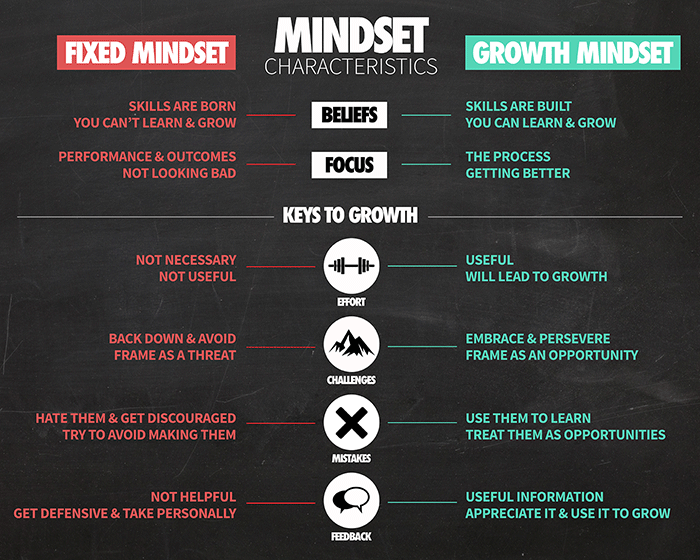
Know-it-all or learn-it-all
One of the benefits of being part of a smaller business is that change can happen quickly. Imagine putting this thinking in place in a huge company.
When Satya Nadella took over as Microsoft’s CEO in 2014 he identified that one of the most important actions to ensure the company's future growth, was to grow each and every one of the 131,000 employees around the world.
Alongside Customer Obsession Satya set about making Growth Mindset a part of the company culture. He believes that learning is the key to the company's future growth. He is working to transform the company culture into one where every individual believes that they can continually grow.
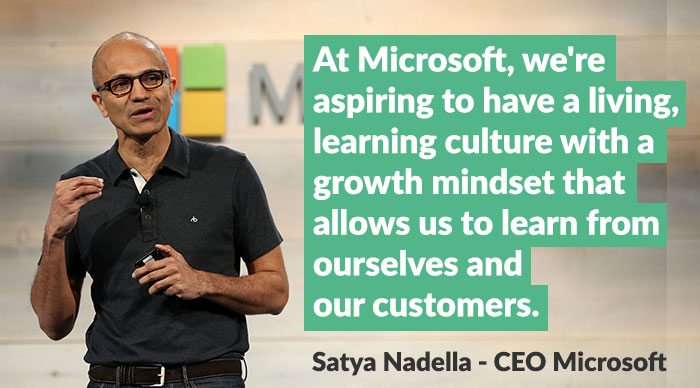
Microsoft continues to invest heavily into programs to help every one of their employees weave growth mindset into their daily work life. In Nadella’s words it is a strategic reorientation from being a company of “know-it-alls” to being a company of “learn-it-alls”.
Growth mindset in action
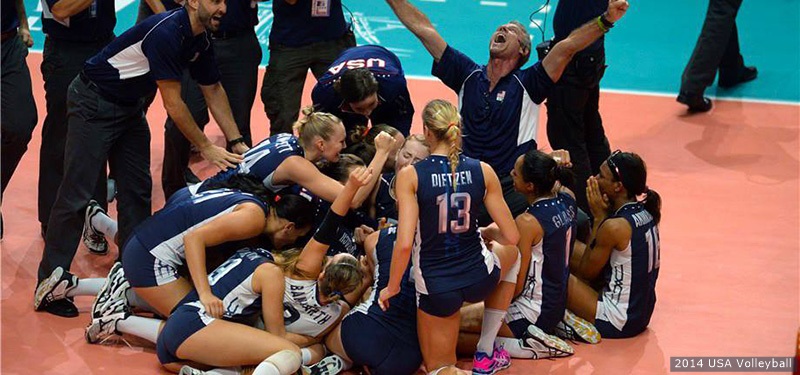
Growth mindset can be used by any team to achieve any goal.
In 2014 coach Karch Kiraly used growth mindset to help take the USA women's volleyball team to achieve their first World Championship title in over 60 years.
He made it very clear to the squad that “What got you here isn’t going to keep you here.” and that “if every player did not improve then they aren’t in the team”.
The key point is that everyone can always improve no matter how good you are.
This whiteboard image from a volleyball coaching event speech by Kiraly , shows the importance of growth mindset in his approach to the turnaround of the team.
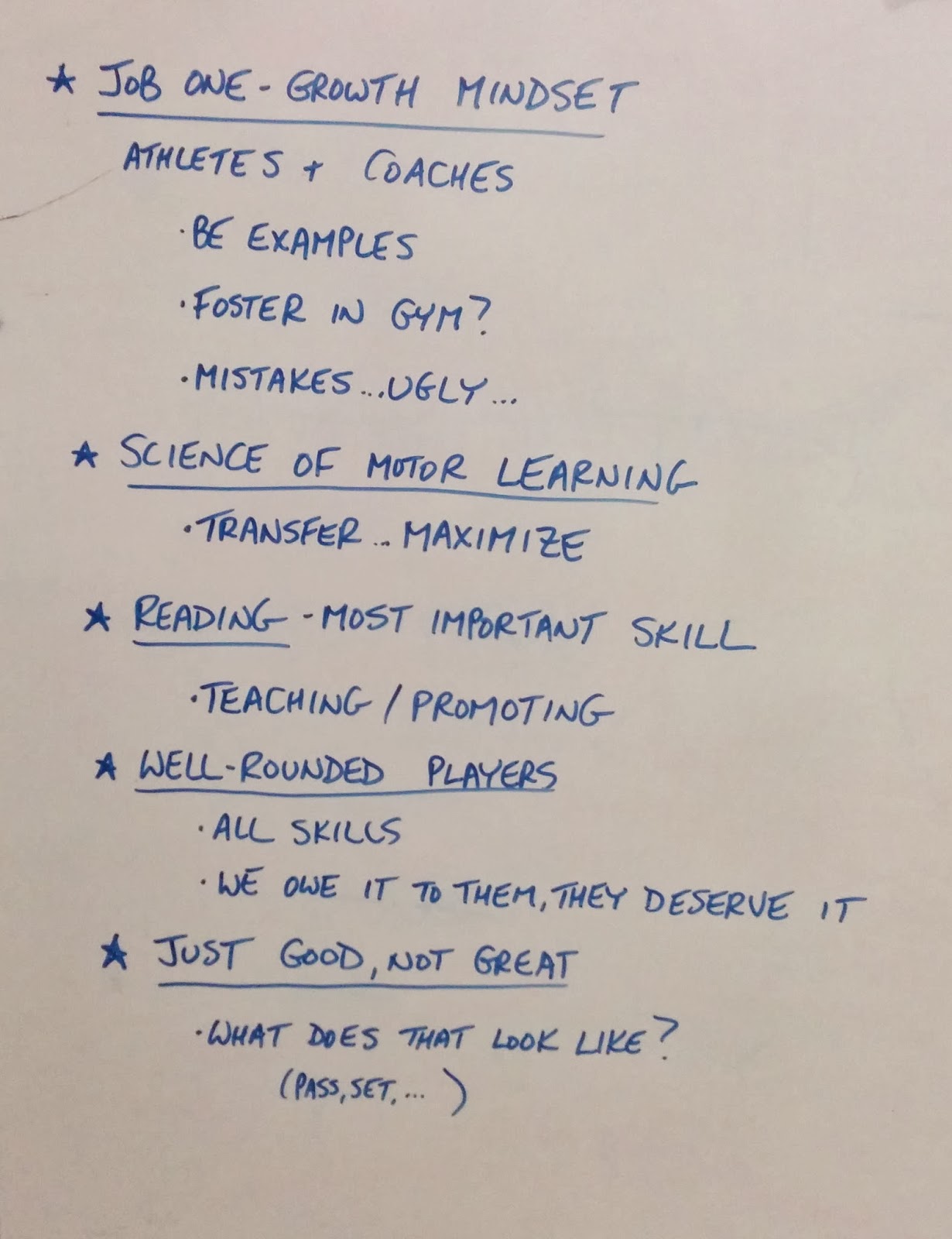
There are some important lessons that you as a business leader or manager can take from this.
- Growth mindset - It’s important that everyone in your team commits to continually growing and getting better. If players don’t want to learn and grow, don’t keep them in your team
- Be examples - Leaders and managers have to embrace growth mindset by being the best examples of it. Design training and work assignments to give your team the opportunity to constantly grow
- Foster in gym and Train Ugly - Design training so that your team can make mistakes and learn to fix them, what Karch Kiraly calls Training Ugly - as the training sessions are ugly while everyone is making mistakes and learning from them
- Motor learning - Maximise your team members real life experience so that they learn faster. Don’t do things for them, let them do it themselves - even if it takes longer at first and they make mistakes, people learn more efficiently by doing
- Reading - Teach your team to read the experience and the people, so that they know what is going to happen before it happens
- Well rounded players - Let the members of your team work and experience the roles of others in the team. Learning others' roles makes team members more well rounded, empathetic of others, better learners and better team players
- Just good, not great - When you’re building your team, look for people with good skills and a growth mindset who are prepared to learn and be coached. Good and a growth mindset is much better than great and a fixed mindset.
Runway over pedigree
Jack Welch the legendary business leader and former CEO of GE, who during his 20 years in the role increased the value of the company by 4000%, is cited by Carol Dweck as a great example of a growth mindset CEO.
He hired according to “runway”, not pedigree often preferring military veterans to Ivy Leaguers, and spent thousands of hours coaching employees on his executive team. For Welch it wasn’t what the person offered today that attracted him, but the potential they offered in the future.
When you’re building your team, learn from Jack and recruit for growth and potential.
We also found this quote from Jack, that makes a perfect segue from growth mindset to Customer Obsession.
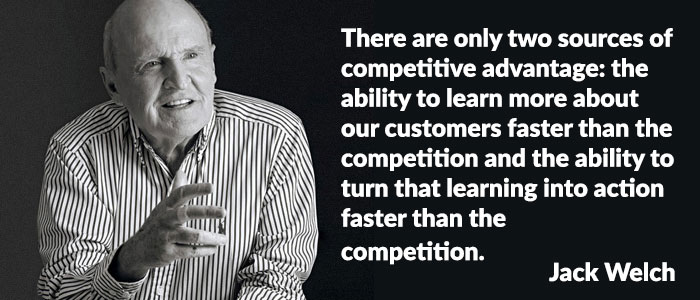
It’s all in the mind
Henry Ford said it best when he said:
whether you believe you can do something or not, you are probably right”
Business growth and Customer Obsession go hand in hand with a growth mindset.
It starts with belief, summed up in a vision and mission. Then it’s about embracing learning and encouraging every opportunity to learn. Appreciating that you can’t know-it-all and nothing is ever perfect, because you can always make it better.
When you appreciate this you eagerly take up challenges and opportunities to make mistakes. Learning from the feedback and using it as an opportunity to grow and provide even better products and services for your customers.
As an individual and an organisation you’ll be somewhere on the mindset spectrum, either leaning more towards a fixed or growth mindset.
Now you know the importance of a growth mindset, you can take steps to encourage in all aspects of your work and personal life.
To answer the title of this post, a growth mindset may not be essential to short term business success, it is however essential, if Customer Obsession and long term sustainable success are your goals.
How do you think mindset has affected your past successes and failures? Share your experiences with us on social - you can find us on LinkedIn, Facebook and Twitter - we look forward to hearing from you.
